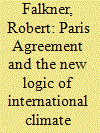| Srl | Item |
| 1 |
ID:
148456


|
|
|
|
|
| Summary/Abstract |
This article reviews and assesses the outcome of the 21st Conference of the Parties (COP-21) to the United Nations Framework Convention on Climate Change (UNFCCC), held in Paris in December 2015. It argues that the Paris Agreement breaks new ground in international climate policy, by acknowledging the primacy of domestic politics in climate change and allowing countries to set their own level of ambition for climate change mitigation. It creates a framework for making voluntary pledges that can be compared and reviewed internationally, in the hope that global ambition can be increased through a process of ‘naming and shaming’. By sidestepping distributional conflicts, the Paris Agreement manages to remove one of the biggest barriers to international climate cooperation. It recognizes that none of the major powers can be forced into drastic emissions cuts. However, instead of leaving mitigation efforts to an entirely bottom-up logic, it embeds country pledges in an international system of climate accountability and a ‘ratchet mechanism’, thus offering the chance of more durable international cooperation. At the same time, it is far from clear whether the treaty can actually deliver on the urgent need to de-carbonize the global economy. The past record of climate policies suggests that governments have a tendency to express lofty aspirations but avoid tough decisions. For the Paris Agreement to make a difference, the new logic of ‘pledge and review’ will need to mobilize international and domestic pressure and generate political momentum behind more substantial climate policies worldwide. It matters, therefore, whether the Paris Agreement's new approach can be made to work.
|
|
|
|
|
|
|
|
|
|
|
|
|
|
|
|
| 2 |
ID:
179615


|
|
|
|
|
| Summary/Abstract |
India’s rise on global platform over issues related to environment initiated when the former Prime Minister Indira Gandhi spoke at the United Nations Conference on Environment and Development(UNCED). India has taken a long leap since that day. In 1992, when the UNFCCC was formed, India was in the group of those nations which were vulnerable but did not have a say in the negotiations. In the early 90s phase, the conditions of India were tumultuous to make any significant stride in the economic or political spectrum.
|
|
|
|
|
|
|
|
|
|
|
|
|
|
|
|